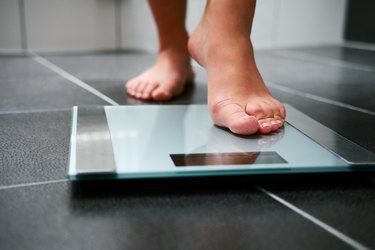
There are a seemingly endless number of weight-loss programs out there, like Jenny Craig, Nutrisystem, the South Beach Diet and The Zone. But the grandaddy of them all — Weight Watchers, now called WW — has been helping people drop pounds for more than 55 years. But what is Weight Watchers, exactly?
This points-driven program teaches you to make nutritious food choices and control calories for weight loss while still allowing you to pick what you like to eat, according to the Mayo Clinic.
It was named the best weight-loss diet for 2022 (tied with the Volumetrics and flexitarian diets) by U.S. News & World Report. But that doesn't mean it's right for everyone.
Check out our guide to determine if WW is the best investment for you. But first, make sure to check in with your doctor before making any significant changes to your diet.
What Is Weight Watchers, Exactly?
WW is a weight-loss program that assigns points to individual foods according to their nutritional value, per the website. When you join, your personal daily points "budget" is calculated based on your current weight, height, age, gender and weight-loss goal.
While the basics haven't changed much, WW has incorporated scientific research to update parts of its program over the years. For instance, Weight Watchers rebranded in 2018, installing a new name and logo, WW, to signify a shift toward general wellness (more exercise, mindfulness and positivity, to be specific) and away from an exclusive focus on weight loss.
Most recently, WW introduced its PersonalPoints Program, which builds you a customized Points budget and ZeroPoint food list based on your lifestyle and health needs, per the website. Eating nutritious foods, hydrating and exercising also allow you to add to your Points allocation.
The PersonalPoints Program also calculates a food's points based on its overall nutrition, rather than single factors like calories or fat content. For instance, added sugar or saturated fat can increase a food's point value, whereas nutrients like fiber or unsaturated fat lower the number, according to the website.
Does It Work — and How Much Weight Will I Lose?

WW advocates a slow-and-steady weight-loss approach by encouraging portion control, informed food choices and physical activity. The plan also supports participants by offering online resources, 24/7 chat groups, in-person meetings and one-on-one sessions with weight-loss counselors.
One of the most important components of the program is the tracking of food intake, says Lara Field, RDN, a Chicago-based registered dietitian and the owner/founder of FEED Nutrition Consulting.
"When dieters have to report their consumption, typically they are more thoughtful about what they are eating each day," Field says.
Research around WWs' efficacy is vast and varied, but for the most part, recent studies have concluded that the program is generally successful in helping people lose weight.
A December 2013 study in the The American Journal of Medicine, for example, noted that the 147 people assigned to the Weight Watchers model of behavioral counseling and one-on-one meetings had more weight loss than those who were enrolled in self-help programs.
And an April 2015 review of 39 studies in the Annals of Internal Medicine found that those who stuck to the Weight Watchers plan were 2.6 percent more likely to drop pounds than those who tried weight-loss counseling alone.
When it comes to just how much weight you're able to lose on the plan, that depends on the effort you put in (think: how closely you stick to your program and how much exercise you incorporate), how long you follow WW and your ultimate weight-loss goal, Fields says.
For example, she says participants who follow the program closely are likely to lose 1 to 2 pounds per week, which is a sustainable rate of weight loss. "Any more than that may be too difficult for the body to maintain and the dieter may regain it," she says.
Plus, according to the Mayo Clinic, you're more likely to shed fat at this pace than water weight or lean muscle mass.
Ready to Lose Weight?
Set yourself up for success with LIVESTRONG.com's Weight-Loss Kickstart program.
Is It Expensive?
The price of WW depends on which plan you pick and may vary slightly based on your location. New members can choose from these subscription options:
- Digital: Starts at around $3.38 per week
- Digital 360: Starts at around $4.61 per week
- Unlimited Workshops + Digital: Starts at around $6.92 per week
Typically, the program also charges a $20 starter fee, but this is often waived through promotions.
Tip
Keep in mind that subscription prices do not include the cost of food. Unlike some other weight-loss programs, WW does not include pre-packaged meals, so participants are responsible for buying their own.
The Pros of Weight Watchers
Now that you know what Weight Watchers is, here are some of the benefits of the program:
1. It's Less Complicated Than Other Diets
An algorithm assigns each food a certain amount of points based on its nutritional content, and participants are allotted a number of points for each day based on factors like age, size and weight-loss goals, according to the WW website.
2. It's Not Too Restrictive
Field praises the program for its balanced approach to weight-loss nutrition, as it encourages participants to eat more fruits, veggies and lean protein and less sugar and trans and saturated fats.
No foods are forbidden on the plan, either, per the website, which can make it easier to follow while enjoying social activities like going out to dinner or attending a barbecue.
Indeed, flexibility is a hallmark of WW, as points can be shifted from one day to the next. If you know, for example, that you'll be eating birthday cake and ice cream in a few days, you can balance those higher-point foods with lower-point options throughout the week.
3. It Can Support Weight Loss
As mentioned above, there's evidence to show that WW can help you lose weight. And the program's emphasis on building lifestyle habits like a nutritious diet and regular exercise may also make your weight loss more sustainable in the long term, according to the Mayo Clinic.
4. You're Part of a Community
WW allows you to tap into a large community of like-minded folks who all want to drop weight together — and, as they say, there's power in numbers.
Members have access to a website, chat groups, meetings and more, which means they don't have to go it alone, and that feeling of support often leads to successful weight loss, Field says.
5. It's Educational
WW can help people understand the nutritional value of individual foods, as well as concepts like portion control, Field says.
This awareness about food teaches members to recognize what's nutritious and what's not, and how much they should really be eating each day — lessons that they can take with them after they've finished the program.
The Potential Cons of Weight Watchers

On the flip side, WW can have its drawbacks. Here are some of those cons:
1. Counting Isn't for Everyone
"Despite the recent re-branding, [WW] is still a diet with rules, restrictions and counting," says Alissa Rumsey, RD, the New York City-based dietitian and owner behind Alissa Rumsey Nutrition and Wellness.
Counting and logging Weight Watchers points may lead some to food preoccupation and obsession, she says.
2. It's an Investment
Being able to attend meetings means springing for the higher-priced plan, which means you're shelling out cash and spending time at in-person or virtual sessions. Some may spend even more on the program's branded food line.
3. It May Encourage You to Label Foods
Even though foods aren't "good" or "bad," the points system may make some people think in terms of these categories — and this can lead to an all-or-nothing mindset, Rumsey says.
"Many who eat a food that's 'bad' end up feeling badly, and they may ultimately quit the diet," she says.
4. There's a Lot of Freedom
Yup, the flexibility of the program cuts both ways, Rumsey says.
You can eat what you want within your points budget (and can even add to that allotment by eating whole foods, exercising and properly hydrating), but this leeway may be too tempting for some, who might pick less-than-nutritious options at some meals and still meet their points goal.
Tip
Before getting started, work with your doctor or registered dietitian to determine if WW is the best eating plan and lifestyle guide for your individual needs.
What to Eat
There's no restrictions on what you can and can't eat. That said, there is a list of foods that don't count toward your points to encourage users to make nutritious dietary choices.
These zero-point foods vary based on your PersonalPoints plan, which you'll match with at the start of the program depending on your unique lifestyle and health needs, per the website. For instance, if you have diabetes, your ZeroPoint list may include foods that are less likely to affect your blood sugar levels.
In general, though, here's a list of nutritious power foods to include in a WW diet:
- Fibrous foods like fruit, vegetables, legumes and whole grains
- Lean proteins like fish, poultry, eggs, tofu and tempeh
- Beneficial fats like nuts, seeds and olive oil
Sample Meal Plan
WW is pretty customizable as long as you follow your personal plan's guidelines, Field says. "That said, I would advise those on this plan to focus on fiber sources to encourage fullness throughout the day," she adds.
Good sources of fiber include:
- Vegetables like hearty greens, bell pepper and asparagus
- Fruits like passionfruit, avocado and guava
- Whole grains like oatmeal, quinoa, brown rice
- Legumes like beans, peas and lentils
Here's a general idea of what a daily menu might look like for someone following WW, but keep in mind that daily point allocations and zero-point foods will vary from person to person depending on factors like physical activity level, weight-loss goals and health needs.
Breakfast
- Breakfast sandwich with 2 slices of reduced-fat bacon, 2 eggs and 1 slice of low-fat American cheese on a slider-sized roll (5 points)
- 1/2 a medium grapefruit (0 points)
- Coffee or tea, black or with a non-calorie sweetener
Snack #1
- 1 cup of red seedless grapes (0 points)
- 10 unsalted almonds (0 points)
- 2 ounces low-fat cheddar cheese (2 points)
Lunch
- Salad with 1 cup baby arugula; 1 cup Boston lettuce; two small, sliced radishes; half a Persian mini cucumber; 3 ounces cooked, boneless and skinless chicken breast; 3/4 cup blueberries; 1 1/2 tablespoons toasted walnuts; and 1 1/2 tablespoons creamy ranch salad dressing (5 points)
- One clementine (0 points)
Snack #2
Dip made by blending together 1/2 cup baby spinach; 1/4 cup plain, fat-free Greek yogurt; 1/4 cup basil; 1 small scallion; 2 teaspoons Parmesan cheese; and salt and pepper to taste. Serve with 1 tablespoon diced tomatoes and 6 whole-wheat pita chips (3 points)
Dinner
- 4 ounces lean flank steak, seasoned with herbs; 1/2 cup canned cannellini beans, heated; and 4 medium stalks roasted baby broccoli, all seasoned to taste with 1 teaspoon olive oil and herbs of choice (4 points)
Dessert
- 1 vanilla pizzelle cookie topped with 2 teaspoons mini chocolate chips and 10 mini marshmallows, broiled until chocolate is melted and marshmallows are lightly toasted (4 points)
Is There Anyone Who Shouldn't Try WW?
Anyone who needs to lose weight is eligible for a weight-loss plan such as WW. But there are some categories of people who should use caution with this program.
"Those with binge-eating behaviors may find this plan difficult," Field says. And if you need to follow a very strict eating plan for health reasons, the freedom of WW may make it hard to adhere to your regimen.


